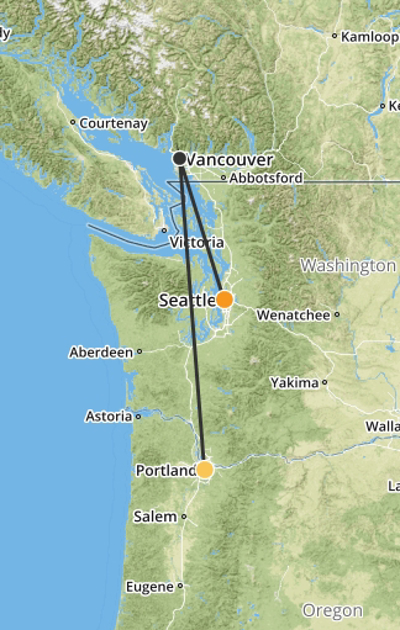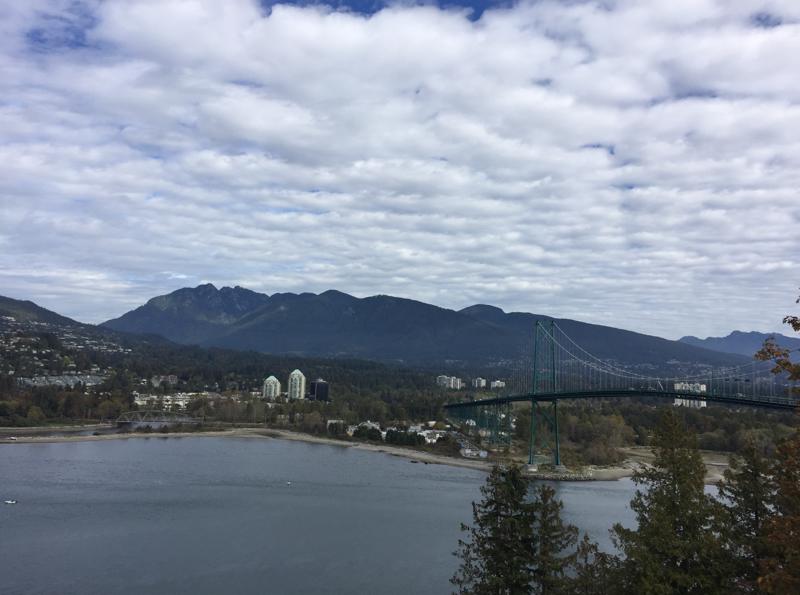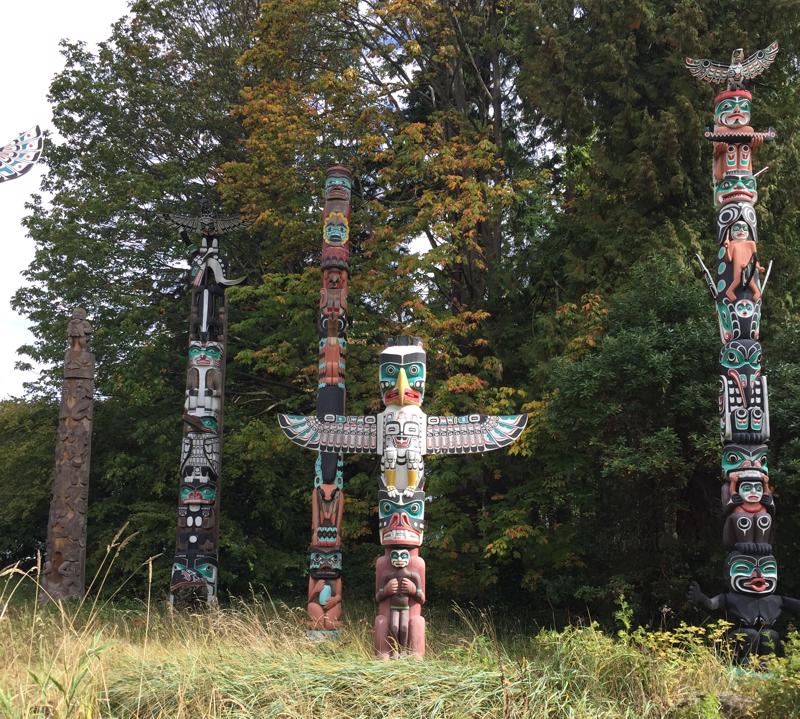My diary
My trip to the west coast could not have been more perfectly planned. Just as we were reading a chapter on Filipina women in Canada I am going to that very place...
Though not leaving North America I was able to think differently on this trip because of the course reading and being intentional about this (much to my wife's dismay I am sure as I constantly brought it up during our trip!) My time in Portland was more limited as I we were only there for a wedding which kept us busy. Vancouver and Canada were the areas for me to reflect a bit more. In this entry I am really hoping to combine ruminations with new interaction through direct travel to a different area and country (though still North America). I felt like the direct connection to the reading was perfect reason to more deeply explores my experience on this trip and make meaning of the trip in a different way than I previously would have though of doing. I felt like this was an excellent trip to do what Mohanty calls "education for critical consciousness" by focusing on the "historical configuration of social forms and the way they work subjectively"(pg. 195).
In Vancouver we stayed with some close friends, both involved in Christian Church work, one a professor at the Vancouver School of Theology, the other working with Syrian refugees as they are coming in to Canada. Both are originally from North Carolina and have three kids. They discussed the difficulty of living in a place that though not far, was still vastly different than the US. One of the most shocking things to me was the price of rent and housing in Vancouver. The average house price in over 1 million dollars with most rents being over $2,000 a month. Some people have even resorted to renting out their closets to folks to help themselves make rent. One of our friends was discussing the difficulty of finding housing for refugees in this climate because of the prices and was thankful that church connections were able to get prices down. For our friends they live in a 3bd 2 ba 1400 sq ft house built in the 1940s for $2700 a month.
What is more interesting is the reason for the incredibly high house prices has been a huge influx of foreign money into the real state market over the last several years. Much of this has been from wealthy Chinese folks who have either moved to Canada or are simply investing in real estate. (here is an article about it https://www.theguardian.com/cities/2016/jul/07/vancouver-chinese-city-racism-meets-real-estate-british-columbia)
I could go into greater detail about he housing issue but what is most fascinating is the deep racism that underlies all of this. This even included a "head tax" on Chinese immigrants in which they had to pay a fee for each person attempting to come to the country. Eventually Chinese immigration was even banned in the 1920's.
jalorello
6 chapters
15 Apr 2020
The West Coast
September 29, 2016
|
vancouver, bc
My trip to the west coast could not have been more perfectly planned. Just as we were reading a chapter on Filipina women in Canada I am going to that very place...
Though not leaving North America I was able to think differently on this trip because of the course reading and being intentional about this (much to my wife's dismay I am sure as I constantly brought it up during our trip!) My time in Portland was more limited as I we were only there for a wedding which kept us busy. Vancouver and Canada were the areas for me to reflect a bit more. In this entry I am really hoping to combine ruminations with new interaction through direct travel to a different area and country (though still North America). I felt like the direct connection to the reading was perfect reason to more deeply explores my experience on this trip and make meaning of the trip in a different way than I previously would have though of doing. I felt like this was an excellent trip to do what Mohanty calls "education for critical consciousness" by focusing on the "historical configuration of social forms and the way they work subjectively"(pg. 195).
In Vancouver we stayed with some close friends, both involved in Christian Church work, one a professor at the Vancouver School of Theology, the other working with Syrian refugees as they are coming in to Canada. Both are originally from North Carolina and have three kids. They discussed the difficulty of living in a place that though not far, was still vastly different than the US. One of the most shocking things to me was the price of rent and housing in Vancouver. The average house price in over 1 million dollars with most rents being over $2,000 a month. Some people have even resorted to renting out their closets to folks to help themselves make rent. One of our friends was discussing the difficulty of finding housing for refugees in this climate because of the prices and was thankful that church connections were able to get prices down. For our friends they live in a 3bd 2 ba 1400 sq ft house built in the 1940s for $2700 a month.
What is more interesting is the reason for the incredibly high house prices has been a huge influx of foreign money into the real state market over the last several years. Much of this has been from wealthy Chinese folks who have either moved to Canada or are simply investing in real estate. (here is an article about it https://www.theguardian.com/cities/2016/jul/07/vancouver-chinese-city-racism-meets-real-estate-british-columbia)
I could go into greater detail about he housing issue but what is most fascinating is the deep racism that underlies all of this. This even included a "head tax" on Chinese immigrants in which they had to pay a fee for each person attempting to come to the country. Eventually Chinese immigration was even banned in the 1920's.

Some have argued that this deep racist history has caused politicians and officials to avoid addressing the issue of "hot" money from China entering the housing market. Another issue here is that attempts to do studies to point to where the money is coming from to address the issue has been critiqued for being racist. My friend shared that the most recent study was simply done by analyzing the names of the owners of property and simply looking for non-western first names. Either way something needs to be done here on a number of levels.
Now local advocacy groups of younger middle and working class folks have begin to pop up to address the issues.
I found it so interesting the contrast of different groups of people based on both country of origin and wealth. In our reading from Pratt about the Filipino workers they were only allowed one family member

into Canada and were coming to Canada to send money home and were simultaneously living in Canada and the Phillipines. The wealthy Chinese home owners are doing something similar but in reverse, by spending most of their time in China. The wealth factor also contributes to a much different experience. Canada is allowing this influx of money into their economy for neoliberal purposes, thus there are currently no restrictions like there were for the Filipino families.
This can also be contrasted even further with the Syrian refugees now living in Canada. They may not simultaneously be living trans nationally in both Canada and Syria as their home may be no more.

The refugees we specifically met were musicians in Syria and were actually getting involved in Canada playing music as they were popular among Syrians. They had somewhat transplanted there Syrian identity in a way, while battling enormous expenses, and some islamaphobia. Here I also need to battle with what is being fed to me about Syria, that it is a poor and destitute life (by all accounts this appears to be a tragic space because of civil war, but I feel like I have to recognize this potential position). I need to be sure I am not casting other places as burtal or primitive as Pratt suggests. For these refugees to make it to Canada there also must be some elevation in wealth and social status for them to make it this far. My mind must always " be as ready as Capital, to trace its paths and to imagine alternative destinations" (Mohanty, pg. 251). Antiglobalization and anticapitalism seem to be necessary to sharpen my analysis of what is occurring in Canada. The economic connection here seems clear, but there is also a deep colonial and racist history to the treatment of chinese folks in Vancouver.
The layers I learned within the housing market issues of Vancouver are fascinating to me. In general Vancouver has a large history of immigration from a variety of Asian countries, while also having this incredibly racist history. This history still manifests itself in real and interesting ways. I was surprised to hear that there wasn't much of a "take our country back" mentality around this issue as we see in other places like the Britain and our own home. I was really fascinated by this history that I was able to learn there and how is still a layer as the work through current problems. The combination of the housing prices affect on working class folks, as well as refugees entering the country also adds a whole other layer. The transnational connections are endless.
My other discovery in Canada and the Northwest in general were the deep colonialist history and how some of the history and customs of First nations have been included in the history of Canada in seemingly commodified ways. It seems to me there has been an attempt to show that First Nations of Canada did not "have it as bad" as in the U.S. but death, land removal and other issues still occurred. I included here a picture of the totems in Stanley Park. These are famous for the area and highly visited as they are from different nations and were moved to Stanley park. Deborah Brandt discusses First Nations a bit in Chapter 8 of CTFP. She discusses specifically the tension of Cultural Reclamation/Cultural Reinvention and I tried to figure out if these displays of Totem polls were a part of this. Perhaps a "coming to know the past" in an effort for decolonization (pg. 175). My fear is that it has instead become a co modified eurocentric reinvention and has not be fully reclaimed. Though it does seem true that Canada has attempted to more work in this area of tension around First Nations that perhaps America has. I was not able to fully research the totem otehr than I understand that they were moved from several different places. It looks like they were not something that was created in a sort of community project together with First Nations but were instead taken from First nation areas to be put on display. This of course would not be an effort to decolonize but instead to me would be a replication of the violence of colonization...
Though still in North America my own ignorance and lack of knowledge was fully on display on this trip. I was totally unaware of the racist and colonialist history of our neighbors to the north and am thankful I took this class while I had this trip! I would have never made some of these connections an insights. I was also hyper aware of the local activist and advocacy groups sprouting up in Canada. I was interested to see that some of these are religious organizations even though Canada is a far more secular nation. It was clear that they were attempting to do.
On my trip I was just really able to unpack the colonialist history of my visit alongside the readings and then further unpack the transnational connections which existed. The layers of racism, colonialism within this transnational space was incredible. The only item I did not really unpack was the layer of 3ww though I definitely got this through out readings. I also wondered about my own ability to have a "dissident friendship" across the border with my friends in Canada. Can this allow me to think differently and produce knowledge in a new way? Or in reality is it the same thing in a different place. What I mean is this friendship would simply be an American one, that just happens to be in a different place. I also was able to see the real power of local organizations to create change. I feel like I was always fed this idea, that they were sort of waste of time and couldn't accomplish much. The reality is this is far from the truth, and we need their collaborative efforts in order to initiate change and the local, and then at the global level.
Lock Swarr, A. and Nagar, R. (Eds.). (2010). Critical transnational feminist praxis. NY: SUNY Press. (CTFP)
Talpade Mohanty, C. (2003). Feminism without borders: Decolonizing theory, practicing solidarity. Durham, NC: Duke University Press. (FWB)
Chowdhury, E. and Philipose, L. (Eds.). (2016). Dissident friendships: Feminism, imperialism and transnational solidarity. IL: University of Illinois Press. (DF)
Share your travel adventures like this!
Create your own travel blog in one step
Share with friends and family to follow your journey
Easy set up, no technical knowledge needed and unlimited storage!